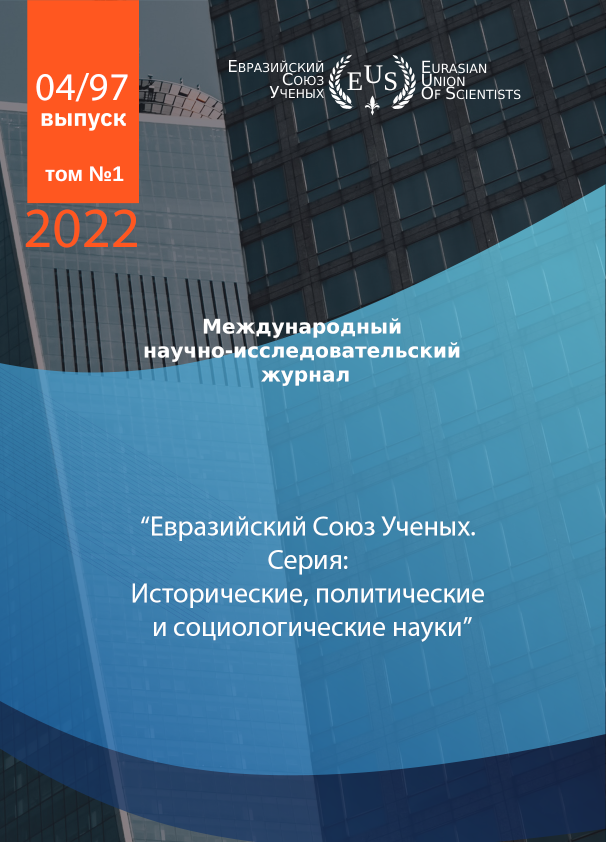ИДЕОЛОГИЧЕСКИЙ СЕПАРАТИЗМ ОБЩЕСТВА ИИСУСА И МИССИОНЕРСКАЯ РОЛЬ ИГНАТИЯ ЛОЙОЛЫ В ПЕРЕДНЕЙ АЗИИ
Аннотация
Существуют различные подходы и мнения среди учёных касательно вопроса главного
предназначения Ордена иезуитов и их миссии. Есть сторонники критического подхода и те, которые
поддерживают идеологию ордена, который неоднозначно повлиял на политическое положение
современной Европы, науку и образование, историю и международные процессы большей части мира.
Орден иезуитов является одним из самых влиятельных орденов католической церкви. Так же вызывают
дискуссию вопросы жизни и деятельности Игнатия Лойолы, его роль как основателя ордена Святого
Иисуса. Актуальность исследуемого вопроса обоснована важностью изучения религиозных и
идеологических факторов в политических процессах Европы и Востока. В процессе написания статьи
были использованы методы: наблюдения, исторический и сравнительный. Была изучена теоретическая
база зарубежных авторов по истории возникновения и деятельности Ордена Иезуитов на Востоке.
Иезуитское учение имеет широкую известность и влияние в современном мире. Главным орудием Ордена
Иезуитов является идеологическая пропаганда: проповеди, образование и миссионерская деятельность.
Педагогическая деятельность, как одна из главных задач Ордена, была выдвинута при его основании. В
XVII-XVIII веках иезуиты имели репутацию блестящих педагогов и преподавателей̆, так как
аккумулировали знания педагогики своего времени с уроками классных занятий, выполнением
упражнений и перехода от лёгкого к трудному. Было бы неправомерным игнорировать влияние Общества
Иисуса на мировую науку и культуру, а также образование, которое по сей день, имеет ту же методику.
Идеологическая деятельность иезуитов не ограничена определёнными рамками, но
образовательная функция в формировании молодых поколений, безусловно, имеет приоритет.
Важную роль играют религиозные организации, в которых проводятся наставляющие проповеди и
прививаются духовные ценности. Иезуитское миссионерство способствует углублению и дальнейшему
развитию всей деятельности данного Ордена. Рабочий язык иезуитов − традиционно латинский. Он
прививается с первых азов приобщения к обществу.
Отрицательным фактором Общества Иисуса является то, что на протяжении почти пяти веков его
членов обвиняли в тайном вмешательстве в мировую политику и исповедовании ересей. В этом аспекте
заслуживает особого внимания личность испанского аристократа, миссионера, создателя Ордена Игнатия
Лойолы. Его духовные взгляды и мировоззрение форматировались по ходу новых социальных и
политических процессов. В статье ярко прослеживается мысль, что духовные ценности общества должны
превалировать, но, ни в коем случае, они не должны иметь характер идеологического сепаратизма
Литература
2. Bjomer G. Istorija ordena iezuitov. – Moskva: Lomonosov, – 2012. – 216 s.
3. Galibina-Lebedeva E.S. Orden iezuitov v Latinskoj Amerike XVII-XIX vv. Na primere Jekvadora. – Moskva: Nauka, – 2014. – 338 s.
4. Galibina-Lebedeva E.S. Orden iezuitov nakanune 500-letija Reformacii // Genesis: istoricheskie issledovanija. – №6. 2017, – s. 135- 157.
5. Grizinger T. Iezuity. Polnaja istorija ordena. – Minsk: MFCP, – 2004. – 640 s.
6. Dzhon U. O’Mjelli, S.J. Pervye iezuity. – Moskva: 2016. – 364 s.
7. Ibragimova R. Katolicheskie missionery XVII veka na Kavkaze // Tarix və onun problemləri, – №3. 2010, – s.42-46.
8. Mihnevich D.E. Ocherki iz istorii katolicheskoj reakcii (iezuity). – Moskva: Izd-vo Akademii nauk SSSR, – 1953. – 312 s.
9. Pochepcov G. Propagandistskie uroki ot Ignasio Lojoly, sozdatelja ordena iezuitov / https://psyfactor.org/lib/propaganda32.htm(Data obrashhenija 1.04.2022)
10. Sennikov E. Razdelenie na klassy i svobodnoe myshlenie: kak iezuity pridumali ideal'nuju sistemu obrazovanija // https://mel.fm/amp/ucheba/shkola/6194785-jesuits(Data obrashhenija 15.04.2022)
11. Skalfi R. Kratkaja istorija katolicheskoj cerkvi. Duhovnaja biblioteka. – Moskva: Duhovnaja biblioteka, – 2018. – 220 s.
12. Shmonin D.V. «Ratio Studiorum» i paradoksy iezuitskogo obrazovanija // Zapiski Gornogo instituta. T.152. – Sankt-Peterburg, – 2002, – s.266-268.
13. Jugasov V. Prinuzhdenie k gosudarstvu. Ad majorem Dei gloriam / K vjashhej slave Bozhiej // https://regnum.ru/news/cultura/2221528.html (Data obrashhenija 19.04.2022)
14. Avrupalilarin iran’a gelme amaçlari. Belgeler. URL: https://9lib.net/article/avrupalilarini̇ran-amaçlari-safevi̇-devleti̇-ki̇mli̇ği̇-resi̇msanati.y4wjlg20 (Data obrashhenija 12.04.2022)
15. Birsel Haktan. Peder Monier’in Gözlemleri ile Fransiz Cizvit 22. Misyonerlerinin Osmanli Topraklarindaki Çalişmalari // Journal of the Human and Social Science Researches // 2013 | Cilt.2, Sayi:2. – S. 100-128.
16. Istek Gülşen. İzvit tarikatinin liselerde verdiği eğitim ve buna karşi oluşan tepkiler: avusturya örneği Akademik İncelemeler Dergisi, 2019, 14/2: – s. 163- 198.
17. Kapici Dilek. Küçük Tataristan’da cizvitler: Kirim hanliği’nda fransiz cizvit misyonu’nun kuruluşu (1706) S.248. Dergipark. URL: https://dergipark.org.tr/tr/download/articlefile/1058341 (Data obrashhenija 15.05.2022)
18. Matthee Rudi. Encyclopedia Iranica edited by Ehsan Yarshater. Isfahan. Volume XIV. 2008.
19. Özkan S. On Yedinci Yüzyilda Anadolu ve Bitlis: Bir Cizvitin Gözlemleri // Güncel tarih / http://www.gunceltarih.org/2018/08/on-yedinciyuzylda-anadolu-ve-bitlis.html (Data obrashhenija 10.04.2022)
20. Şeynurt O. Mekânin “İttihâz”i: Osmanli’nin Son Dönemlerinde Cizvitlerin Kayseri ve Adana’da Bazi İnşaat Faaliyetleri // Sanat, Tasarim ve Mimarlik Fakültesi Dergisi, Cilt:5, Sayi:2, – 2019. – S.91-103.
CC BY-ND
Эта лицензия позволяет свободно распространять произведение, как на коммерческой, так некоммерческой основе, при этом работа должна оставаться неизменной и обязательно должно указываться авторство.





